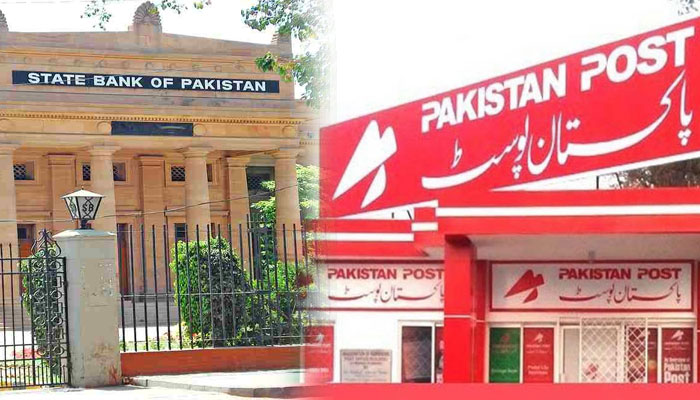‘Liaison with Pakistan Post to improve financial inclusion’
KARACHI: Improving relationship between banks and Pakistan Post will improve financial inclusion of the underserved and unbanked population, especially in the rural areas, a SBP’s report said on Friday.
The State Bank of Pakistan staff notes said cross-country experience has shown that state-owned postal services could play a vital role in financial inclusion.
The government-owned Pakistan Post primarily provides postal services to around 20 million consumers. Its physical branch infrastructure consists of around 2,400 delivery post offices – 87 percent of these are located outside the five most populated cities. This can add to the 3,900 outlets of the Pakistan microfinance industry. The Pakistan Post had around 10,496 post offices spread throughout the country in 2018/19, according to the economic survey. “Access to formal financial institutions for the masses in Pakistan is still quite low. One of the reasons is that formal financial activities are often clustered around bigger hubs of formal economic activity; the country is large and diverse with a bulk of population engaged in the informal sector,” said the report. “Pakistan still lags behind on a number of financial inclusion indicators compared to other countries in the region and beyond. For example, account holding at financial institutions doubled in 2017 as compared to 2011, but was still far lower than the average of South Asia and the world.”
As of June 2020, the Pakistan Post had entered into a 20-year strategic alliance with Habib Bank Limited with the goal of enhancing financial inclusion. Under this arrangement, the Pakistan Post would promote the services of HBL’s branchless banking platform, while HBL would invest in the technology, infrastructure and capacity enhancement of the post office. The report said the post may have to address a few weak links first. For one thing, significant improvement in manpower capable of delivering financial services would be required. This is all the more relevant given the country’s efforts to strengthen its AML/CFT regime. The Pakistan Post was among the entities flagged in the Asia Pacific Group’s ‘AML/CFT mutual evaluation report of Pakistan’ for having grave deficiencies.
“The release of this report in October 2019 was followed by deliberations to significantly restructure the scope and operations of the Pakistan Post,” it said. “As such, Pakistan Post would have to invest in streamlining its operations to comply with regulatory measures before undertaking any new initiatives to aggressively drive postal financial inclusion going forward.” Secondly, Pakistan Post would have to invest in its technology infrastructure to stay relevant. Such investment has important and strategic externalities that outweigh the benefits in the long-run. “Provision of agriculture and livestock insurance schemes, generating local employment opportunities, and collection of financial data of previously unbanked households are some examples that may motivate investment in this legacy institution,” said the report.
-
 Sarah Ferguson, Shamed Andrew Spotted In ‘family Costume Drama’
Sarah Ferguson, Shamed Andrew Spotted In ‘family Costume Drama’ -
 Kylie Kelce Reveals Why She Barely Planned Her Wedding Day?
Kylie Kelce Reveals Why She Barely Planned Her Wedding Day? -
 Why Shamed Andrew Called His Victims ‘Mrs Windsor’
Why Shamed Andrew Called His Victims ‘Mrs Windsor’ -
 Kate Hudson Explains Why Acting Isn't Discussed At Home
Kate Hudson Explains Why Acting Isn't Discussed At Home -
 Prince William, Kate Middleton Epstein Statement Was AI Generated, Says Expert
Prince William, Kate Middleton Epstein Statement Was AI Generated, Says Expert -
 Sarah Ferguson On Her Way To Hurt 'only Two People Who Care About Her'
Sarah Ferguson On Her Way To Hurt 'only Two People Who Care About Her' -
 World’s Top PC Maker Sounds Alarm Over Memory Chip Shortage
World’s Top PC Maker Sounds Alarm Over Memory Chip Shortage -
 King Charles Is ‘clearly Worried’ Andrew Has Tarnished Royal Image
King Charles Is ‘clearly Worried’ Andrew Has Tarnished Royal Image -
 Royal Family Loses 'loyal' Worker After King Charles Disliked His Work?
Royal Family Loses 'loyal' Worker After King Charles Disliked His Work? -
 James Van Der Beek's Quiet Sacrifice Before Death Comes To Light
James Van Der Beek's Quiet Sacrifice Before Death Comes To Light -
 Suspect Kills Six Across Florida Before Taking His Own Life
Suspect Kills Six Across Florida Before Taking His Own Life -
 AI Helps Researchers Identify 2,000-year-old Roman Board Game Stone
AI Helps Researchers Identify 2,000-year-old Roman Board Game Stone -
 Inside Kate Middleton, Prince William’s Nightmare Facing Andrew Mountbatten-Windsor
Inside Kate Middleton, Prince William’s Nightmare Facing Andrew Mountbatten-Windsor -
 Margaret Qualley Shares Heartfelt Confession About Husband Jack Antonoff: 'My Person'
Margaret Qualley Shares Heartfelt Confession About Husband Jack Antonoff: 'My Person' -
 Savannah Guthrie Shares Sweet Childhood Video With Missing Mom Nancy: Watch
Savannah Guthrie Shares Sweet Childhood Video With Missing Mom Nancy: Watch -
 Over $1.5 Million Raised To Support Van Der Beek's Family
Over $1.5 Million Raised To Support Van Der Beek's Family




